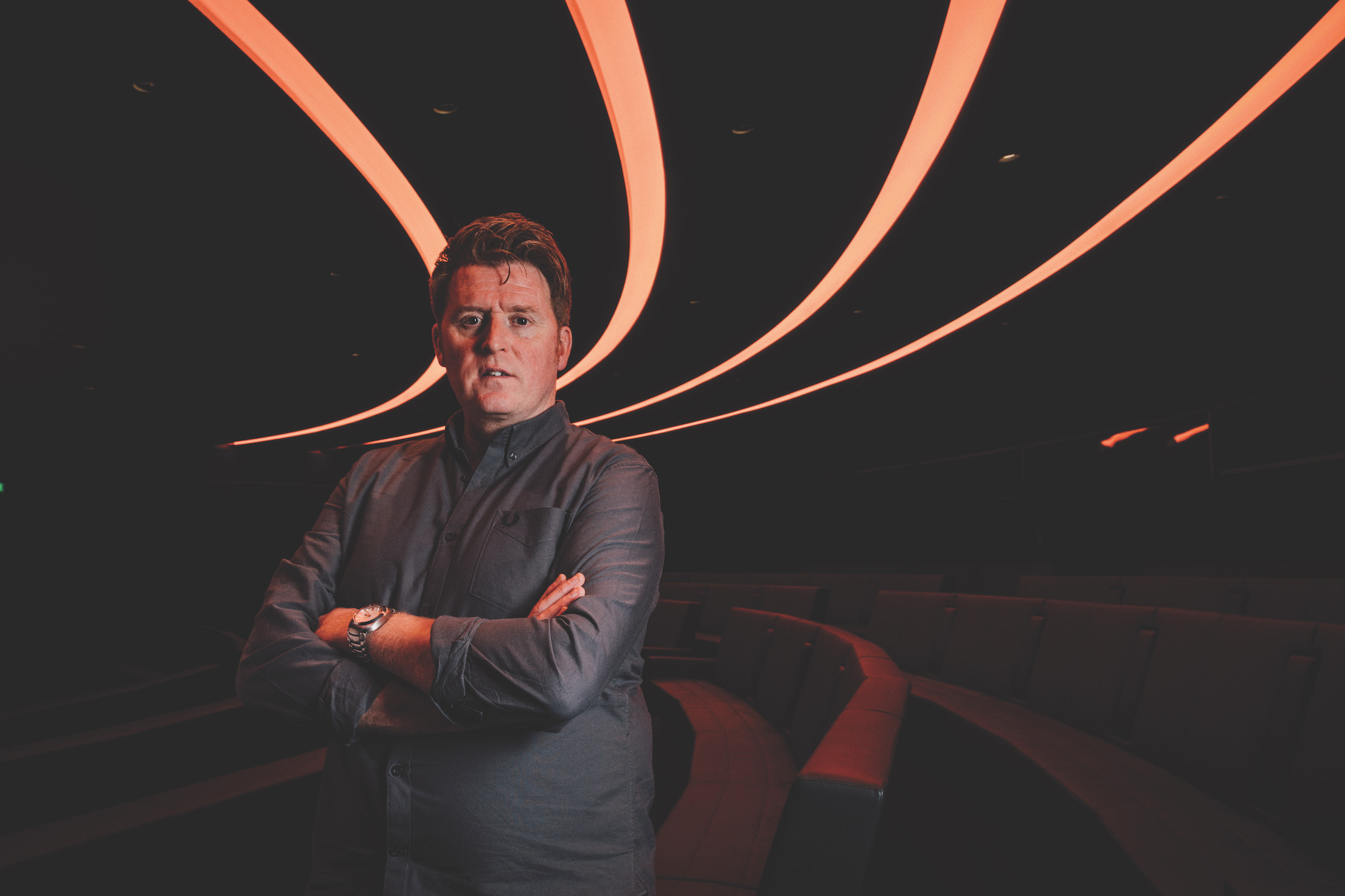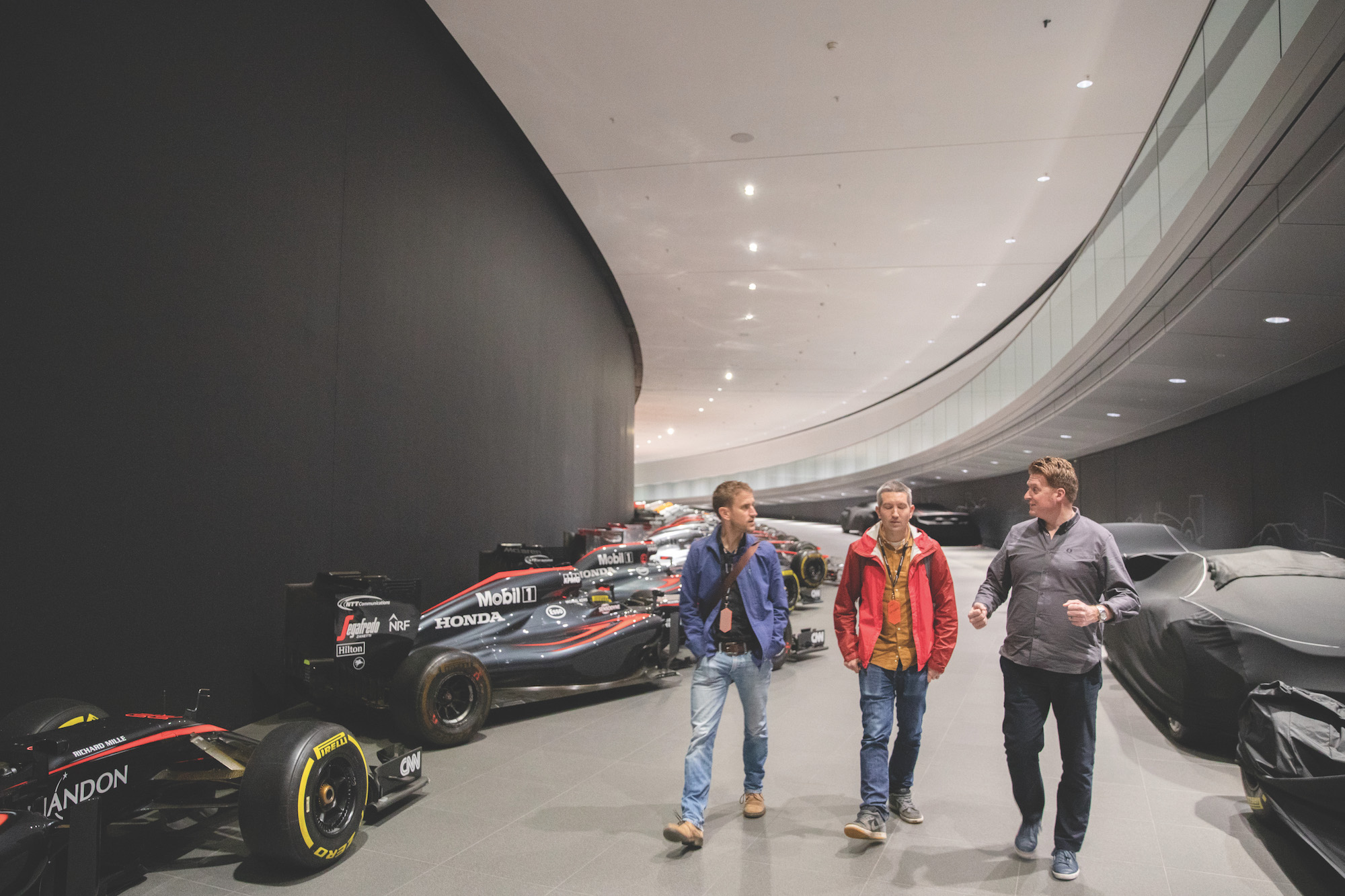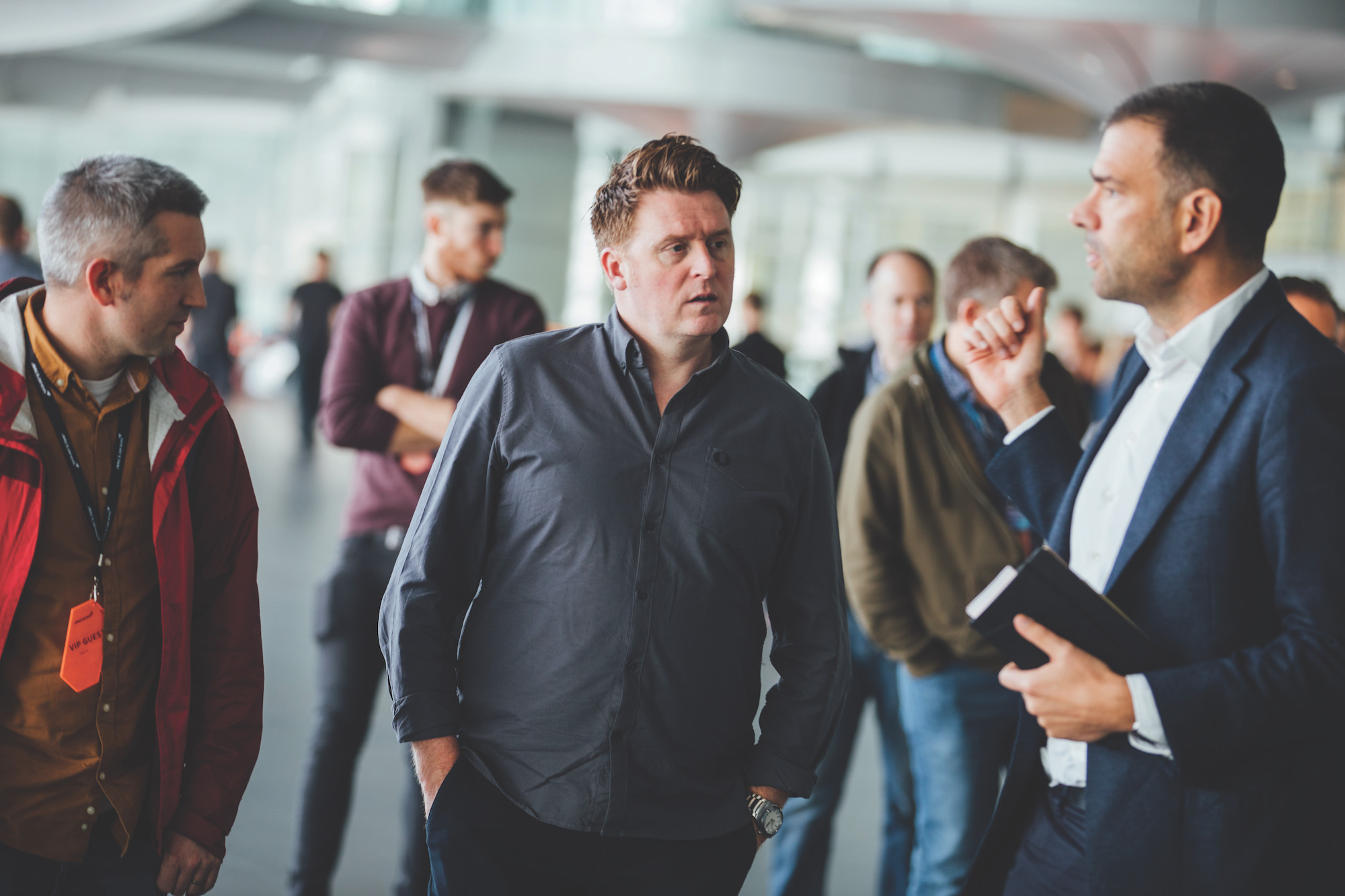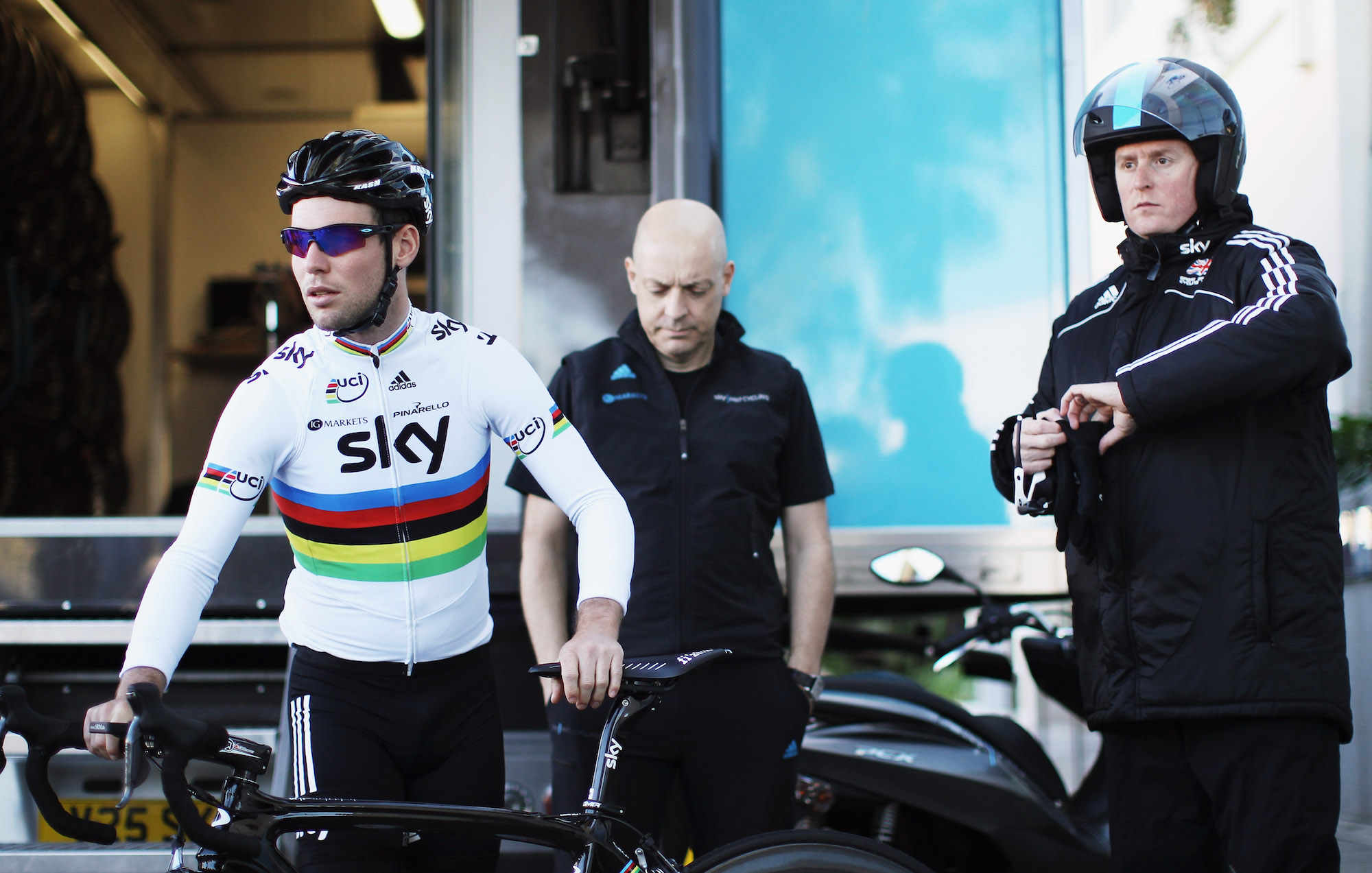Rod Ellingworth: 'In the back of Mark Cavendish's mind he’s got this Tour de France ambition'
Ellingworth goes in depth about the season ahead from the McLaren Technology Centre in Woking, a mix of seven-star hotel, medical laboratory and Bond-villain lair

Rod Ellingworth (Daniel Gould)
The latest race content, interviews, features, reviews and expert buying guides, direct to your inbox!
You are now subscribed
Your newsletter sign-up was successful
Rod Ellingworth has something no other WorldTour team boss has — and he knows it. The driveway approaching the McLaren Technology Centre in Woking takes you over a vast artificial pond — the water was previously used to cool the wind tunnel’s motors — the grandness of which screams, ‘this is not just another corporation’.
Inside, the ambiance is a mix of seven-star hotel, medical laboratory and Bond-villain lair, with its secret doors, spotlessly clean corridors, uneven staircases designed to make you think, and corridors that double as showrooms packed with Formula 1 exotica from the company’s 56-year history. And that’s before you get to the subterranean levels stacked with boffins in white coats and manufacturing facilities that run 24/7.
It’s no accident that Ellingworth was set on bringing the whole team of just under 90 Bahrain-Merida riders and staff here for their first meeting under his leadership, just a week before CW meets him. The McLaren Technology Centre is figuratively a million miles from the Manchester velodrome where he started his management career, let alone the dreary rain-soaked car parks where much of a team’s day-to-day business is conducted, or even the nice hotels in sunny climes teams choose for their annual training camps. While Formula 1 alumni might be inured to McLaren’s charms, coming from the world of cycling, it’s a massive culture shock.
"There’s no other team who have a base and a centre like this and hundreds of people at hand," he says. "You can feel that [racing] passion, somebody from outside of this firm coming in like myself in that first few months of like, wow, you know, it’s really exciting here. If we can just bring in a certain percentage of that into our sport, it’ll make a difference."
The initial approach from McLaren in April 2018 was quite informal. "They wanted to ask somebody who was in the game — who they knew had been part of a group starting a new team — for a bit of experience. You might wonder why someone from a successful team would do that. The reason I agreed to meet them is in 2005 myself and Dave Brailsford met with Shane Bannon from the Australian Federation as we were thinking about moving the BC Academy to Italy and Australia were already there. You think about how the competition on the track is so tight between the two of us, and Shane actually said, ‘Listen, guys, I know this will better your nation by coming to Italy. But we are only as good as our competition.’ I’ve never forgotten that."
Ellingworth says he immediately hit it off with John Allert, McLaren’s chief marketing officer and a long-time cycling fan. When Allert drops into our interview he recalls that over the course of their first conversation Ellingworth changed his phrasing from "you should do this" to "when we do this".
>>> Full-on training, full-time work: How four amateurs stay competitive around their day jobs
The latest race content, interviews, features, reviews and expert buying guides, direct to your inbox!
So it’s not surprising that in the autumn of 2018, as McLaren was preparing to become a joint-owner of the team, that conversation turned into a job offer and Ellingworth says he was clear that he would only move to run the team himself. He and Allert now share an office.
We ask whether he has had any second thoughts, given the Bahrain government’s human rights record, which Amnesty International describes as "grim" and "sinister" due to a history of imprisoning those that are critical of the government, an account the government disputes. Ellingworth says there are others better equipped to grapple with questions about the relationship to the country’s human rights record. He adds: "For me, it’s all about the cycling… At the end of the day, my role is performance. I’m here to try and take a group of guys to try and win bike races — it’s as simple as that for me."
Mr McLaren

Much of Ellingworth’s early days at McLaren, whose name will feature prominently on the team’s jersey next year, have been spent putting in the groundwork to win bike races. He says structure and giving good people responsibility is key. There is now a core team of Roger Hammond (who spent 2019 running the Madison-Genesis team), performance director; Charlie Pym, marketing director; Tim Harris, development director; Brent Copeland (former team principal) operations director and Duncan Bradley — McLaren’s designer behind the Specialized Venge — as technical director.
It is Bradley’s role that will likely be most key, and different from other pro racing teams. "He’s Mr McLaren Applied Technology [the company’s consulting arm], he’s been here quite a long time and as of January we get him full time... He’ll be the game changer. That role will be what will really change the technology, the development of equipment, he’ll be the guy who will lead on that whole process," explains Ellingworth.
"The easy one is the aero package, which we’ve already started with by benchmarking every single piece of equipment that we’ve got. And that’s done here with the main aerodynamicists within McLaren," says Ellingworth. He cautions that much of Bradley’s first year will be spent "listening" and there won’t be any huge technological leaps forward in the near future, he says, acknowledging that “some people will talk the big game but it’s hard to implement in the field".
He adds: "I think race modelling is quite interesting, you know, and sort of the one that most teams are doing now is around team time trial modelling, so you predict your line-ups and length of turns and the strategy of how you can go from A to B as fast as you can as a team." He doesn’t entirely rule out being able to apply something similar to a bunch race.
McLaren also has a "mission control" centre which it runs its motor racing teams from, with live data and analysis supporting the team at the race. Will he be given the keys? Ellingworth’s response makes it clear it’s too early to tell but he does say: "Absolutely every team looks at the function of sports directors in the car when the radios aren’t working and what to do then… We don’t have the luxury of being in one location [like motorsport], it’s not as straightforward when you’re banging through the Pyrenees.”
Performance planning

Ellingworth has long been hot on discipline, systems and attention to detail as a cornerstone of success. With regard to those policies and systems, Ellingworth describes what they’ve been doing as "co-creating a new team" drawing on their various experiences.
When we ask what he wants to see in 2020, while he says they want to win "a good chunk" of races, he is most keen that the "performance planning" is moving towards being "world class". That is after all the only way they’ll win the Tour de France. Ellingworth declines to put a timescale on when he wants to do that by but does say: "We’re going to try from day one. Do we think we’ve got a rider who can win the Tour? In Mikel Landa [who joins from Movistar in 2020] I think we do, on the right course on the right day, at the right time. Next year’s course is actually pretty good for him potentially. We’ll push."
It’s less clear, however, that the team, which has been centred on Vincenzo Nibali — bound for Trek-Segafredo — for the last three years, has the strength to support winning the sport’s biggest race next year. Ellingworth is upbeat: "There’s some really good quality in the team and there’s some unknowns." He adds that the team lacks the depth of some other squads, which he says is part and parcel of having a budget he describes as in the middle of the pack of the WorldTour and clearly less than that enjoyed by Ineos, which outstrips the rest.
However, he adds: "These young kids are coming in now, and they can perform, so it’s all about recruitment and talent spotting." In that regard he is placing big faith in Harris, key member of the Rayner Foundation who has been helping develop riders for years. "He’s got a remit to spend time at the U23 and junior races within his job description, to be out there at the l’Avenirs scouting and to form relationships with on U23 teams and national federations… He’ll be somebody checking on the welfare of our young riders in our team. So we’ve really got a welfare vision; we want these kids to be in the sport for 15 or 16 years, whether they’re with us or not, you know, we’re about developing people."
He uses the example of 20-year-old Santiago Buitrago Sanchez, who has signed for 2020. He says the team is paying a family in Italy to look after him when he comes to Europe — he’ll live in Colombia most of the time. That is solely to ensure his welfare and his development, rather than throwing him alone in at the deep end in a new country, a new team, at the top of professional sport.
There’ll be more of that as he clearly sees getting good young riders as crucial to future success. He’s already written a three-year rider recruitment strategy by the time we meet and he’s organised to have 25 rider agents come to a presentation next week on the team’s plans and objectives. "I want to get a lot more rigorous around the information we get from agents. It’s absolutely diabolical how we recruit people in our sport, or when you look at other sports and how governed it is, the level of information. You spend a lot of money on these riders and you don’t even know them," he says.
He is adamant that the team won’t hire a rider it doesn’t know. For many that will entail the team having seen data on them, had discussions with and likely brought them to training camps. He says that he won’t deal with any agents that think that’s too challenging but says he expects most will be on board.
Cav’s return

While it might be the young guys that are the team’s future, and Landa that is their best hope of immediate Tour de France glory, no one’s arrival is more pregnant with anticipation than Mark Cavendish’s. The former world champion and winner of 30 Tour stages has a long-standing relationship with Ellingworth and his presence at the team helped get Cavendish’s signature on a one-year contract.
Cavendish, who will admit he’s not always the easiest character to work with, credits Ellingworth with being the one who spotted and nurtured his potential when others dismissed him in his first days at British Cycling. In his autobiography At Speed, he wrote: "'Doctor Frankenstein’ Brian [Holm, Quick Step sports director] called Rod. Obviously, because he was the one who had created the monster."
When we raise Cavendish, Ellingworth says, "It was quite strange thinking I’ll be working with him again," as he pulls a comedically exasperated face.
The sprinter, who has suffered with injury and the Epstein Barr virus for the last couple of seasons, last won a race at the Dubai Tour in February 2018.
>>> Cycling Weekly is available on your Smart phone, tablet and desktop
He hasn’t won multiple races in a season since 2016, when he won four stages of the Tour de France. Ellingworth says the last two years have been "traumatic". "It’s the only time actually in my whole time working with Mark that I’ve ever related anything to myself. I had Epstein Barr, back in 1995 and I remember very clearly — it affected me for about a year and a half — I felt like I could never go into top gear. You’re limited. You could try hard, but you couldn’t ever really go that deep. I said, ‘Listen, mate, I had this as well. So I’m with you on this. I understand what you’re going through," he recalls.
He adds: "We’ve been totally open and honest with him because it’s about winning bike races. We said, ‘Let’s get him back to winning races’ — it doesn’t matter what level, no matter where.
"Obviously in the back of his mind he’s got this Tour ambition. Well, great, if it happens then great. We’re backing him wholeheartedly."
Nor does he feel the 34-year-old’s age will count against him in a peloton stacked with young sprinting talent. This deep into his career, many teams would be interested in Cavendish’s marketing potential as much, if not more than, his results and have him doing a lot of promotional work or taking an expanded role in the team. Ellingworth doesn’t want any of that. "I said, Cav you’re a bike rider, I don’t want anything else. I don’t want you involved in the business or thinking about the structure of the team. Bike riders are there to win or help someone else to win, full stop."
He adds: "I know what he is underneath as a character, those who are close to him know that and I think all athletes need certain types of support at different times and different areas. He’s definitely motivated, but I told him if you’re not fit, you ain’t going to win; it’s as easy as that."
Spot on the wall
The main corridor running down the spine of the McLaren headquarters doubles as the biggest trophy collection in the world. Both walls sport deep cabinets packed with the victory trinkets from Formula 1 and various other forms of motor sport. Tucked right at the end, almost off into a corner, is Mark Cavendish’s World Championship-winning Specialized Venge from 2011, specs of Copenhagen dirt still visible on the frame.
Ellingworth chuckles slightly nervously when we ask if this is where any future cycling trophies will go — we suspect it’s not been discussed with the bosses yet.
But with the considerable tools at his disposal you would be brave to bet against there coming a time when Tour de France cups, Giro d’Italia spirals and maybe a Tirreno-Adriatico trident will jostle for space on that cabinet and that Cavendish’s bike and many others like it will sit neatly alongside the racing cars of motor racing greats such as Alain Prost, Ayrton Senna and Lewis Hamilton. It might take another 56 years but if Ellingworth gets his way it’ll be a lot sooner than that.
This feature originally appeared in the print edition of Cycling Weekly, on sale in newsagents and supermarkets, priced £3.25.
Having trained as a journalist at Cardiff University I spent eight years working as a business journalist covering everything from social care, to construction to the legal profession and riding my bike at the weekends and evenings. When a friend told me Cycling Weekly was looking for a news editor, I didn't give myself much chance of landing the role, but I did and joined the publication in 2016. Since then I've covered Tours de France, World Championships, hour records, spring classics and races in the Middle East. On top of that, since becoming features editor in 2017 I've also been lucky enough to get myself sent to ride my bike for magazine pieces in Portugal and across the UK. They've all been fun but I have an enduring passion for covering the national track championships. It might not be the most glamorous but it's got a real community feeling to it.